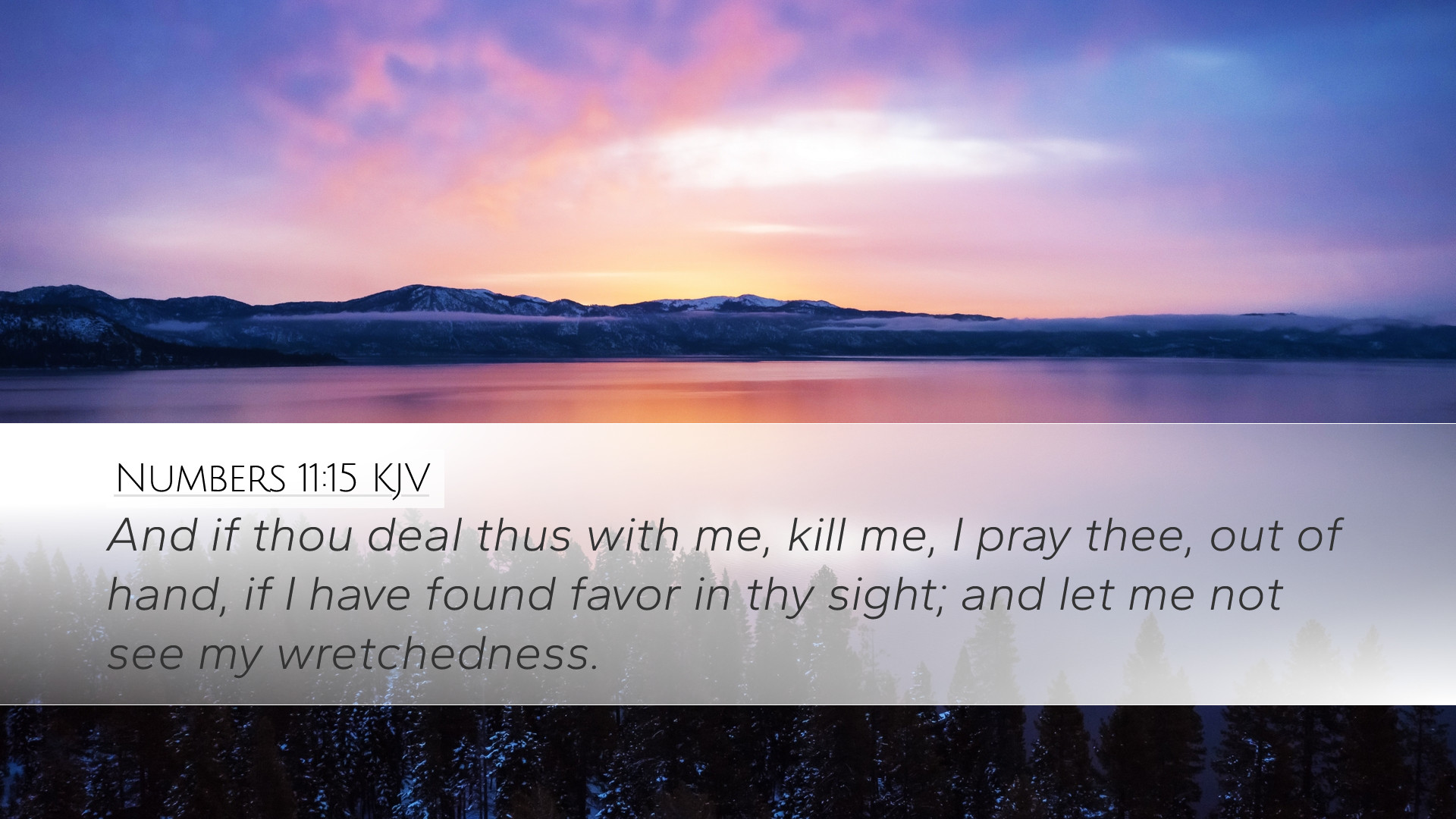Commentary on Numbers 11:15
Numbers 11:15 states, "And if thou deal thus with me, kill me, I pray thee, out of hand, if I have found favor in thy sight; and let me not see my wretchedness." This verse is a poignant expression of Moses' despair as he leads the Israelites through the wilderness. In this commentary, we will explore the context, implications, and theological significance of this verse based on insights from public domain commentaries.
Contextual Analysis
The Book of Numbers details the journey of the Israelites post-exit from Egypt and highlights the challenges faced by Moses as their leader. In this chapter, the people of Israel are expressing their discontent and longing for the food they had in Egypt, leading to a crisis in leadership. Moses feels overwhelmed by their complaints and the burden of leadership.
- Moses' Leadership Burden: Moses experienced a profound sense of responsibility for the people he was tasked to lead. His cry reflects not only personal anguish but also the weight of leadership that often leads one to deep despair.
- The People’s Complaints: The context surrounding this verse highlights the fickle nature of the Israelites, revealing a key aspect of their character. They had grown tired of the divine provision of manna and desired the flesh pots of Egypt, symbolizing a longing for the comforts of their past enslavement.
Theological Implications
This verse elicits rich theological reflections, particularly concerning God's sovereignty, human weakness, and divine provision. The interplay of these themes elucidates both Moses' struggles and the people's relational dynamics with God.
- God’s Sovereignty: The plea of Moses shows his acute awareness of God’s sovereignty in his life. He recognizes that the burden he bears is a divine assignment, yet in that moment of despair, he questions his ability to fulfill it. This reflects a common struggle among leaders who wrestle with their inadequacy in fulfilling God's call.
- The Nature of Human Despair: Moses' statement introduces the uncomfortable reality of despair in the midst of divine calling. It evokes empathy and recognition that even the greatest of leaders, such as Moses, were not immune to discouragement and sorrow.
- Divine Provision vs. Human Cravings: The tension between God’s provision (the manna) and the cravings of the flesh (the desires for meat from Egypt) is emblematic of spiritual struggles that transcend time. This serves as a reminder for believers to reflect on their own contentment with God’s provisions in their lives.
Commentary Insights
In analyzing this verse, prominent commentators provide valuable insights that deepen our understanding:
- Matthew Henry: Henry reflects upon Moses’ transparent state before God, striving to communicate his feelings honestly. He notes that this honest expression underscores the necessity of heartfelt communication with God, especially when in distress. Henry marvels at how God's servants may experience intense trials but are also safe in the knowledge that God is attentive to their struggles.
- Albert Barnes: Barnes emphasizes the gravity of Moses’ words as indicative of a breakdown in his mental and emotional state. He considers the implications of Moses’ request for death as a desperate plea for relief from the burdens of leadership. This highlights the vital need for spiritual and physical renewal, encouraging leaders to seek divine strength amidst trials.
- Adam Clarke: Clarke dives into the spiritual significance of this verse, associating it with the larger narrative of suffering and comfort throughout scripture. He intricately connects Moses’ lament to the greater story of redemption, illustrating that even in moments of profound despair, God’s overarching plan remains unthwarted.
Conclusion and Applications
Moses' plea in Numbers 11:15 serves not only to reveal his personal struggles but also to illustrate the broader themes of human frailty, divine provision, and the depth of God’s engagement with His people. For pastors, theologians, and students of the Word, this passage invites a profound reflection on the nature of leadership, the complexities of human emotions, and the faithful responses to God amidst trials.
As scholars delve into the context and implications of this verse, it calls each individual to examine how they respond to burdens and the moments when they feel overwhelmed. In leadership, in life, and in faith, the call remains to communicate honestly with God and to derive strength from His presence. Just as God sustained Moses, He remains our refuge in times of distress.
Reflection Questions:
- What can we learn from Moses’ openness about his struggles? How can we apply this in our own lives?
- In what ways do we find ourselves longing for what we deem "better" in our past rather than embracing God’s provision?
- How can leaders maintain their spiritual health when faced with overwhelming burdens?


